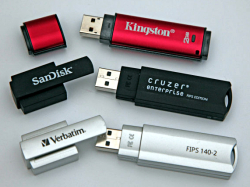NIST-certified USB Flash drives with hardware encryption cracked

![]() Encrypting USB Flash memory from Kingston, SanDisk and Verbatim
Kingston, SanDisk and Verbatim all sell quite similar USB Flash drives with AES 256-bit hardware encryption that supposedly meet the highest security standards. This is emphasised by the FIPS 140-2 Level 2 certificate issued by the US National Institute of Standards and Technology (NIST), which validates the USB drives for use with sensitive government data. Security firm SySS, however, has found that despite this it is relatively easy to access the unencrypted data, even without the required password.
Encrypting USB Flash memory from Kingston, SanDisk and Verbatim
Kingston, SanDisk and Verbatim all sell quite similar USB Flash drives with AES 256-bit hardware encryption that supposedly meet the highest security standards. This is emphasised by the FIPS 140-2 Level 2 certificate issued by the US National Institute of Standards and Technology (NIST), which validates the USB drives for use with sensitive government data. Security firm SySS, however, has found that despite this it is relatively easy to access the unencrypted data, even without the required password.
The USB drives in question encrypt the stored data via the practically uncrackable AES 256-bit hardware encryption system. Therefore, the main point of attack for accessing the plain text data stored on the drive is the password entry mechanism. When analysing the relevant Windows program, the SySS security experts found a rather blatant flaw that has quite obviously slipped through testers' nets. During a successful authorisation procedure the program will, irrespective of the password, always send the same character string to the drive after performing various crypto operations – and this is the case for all USB Flash drives of this type.
Cracking the drives is therefore quite simple. The SySS experts wrote a small tool for the active password entry program's RAM which always made sure that the appropriate string was sent to the drive, irrespective of the password entered and as a result gained immediate access to all the data on the drive. The vulnerable devices include the Kingston DataTraveler BlackBox, the SanDisk Cruzer Enterprise FIPS Edition and the Verbatim Corporate Secure FIPS Edition.
When notified by SySS about this worst case security scenario, the respective vendors responded quite differently. Kingston started a recall of the affected products; SanDisk and Verbatim issued woolly security bulletins about a "potential vulnerability in the access control application" and provided a software update. When asked by heise Security, Verbatim Europe said that none of the affected drives have been sold in Europe – and that none will be shipped before the hole has been closed.
The real question, however, remains unanswered – how could USB Flash drives that exhibit such a serious security hole be given one of the highest certificates for crypto devices? Even more importantly, perhaps – what is the value of a certification that fails to detect such holes?
(Juergen Schmidt)
(trk)








![Kernel Log: Coming in 3.10 (Part 3) [--] Infrastructure](/imgs/43/1/0/4/2/6/7/2/comingin310_4_kicker-4977194bfb0de0d7.png)

![Kernel Log: Coming in 3.10 (Part 3) [--] Infrastructure](/imgs/43/1/0/4/2/3/2/3/comingin310_3_kicker-151cd7b9e9660f05.png)








